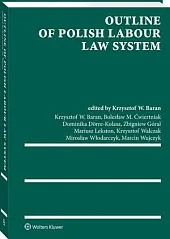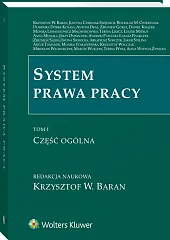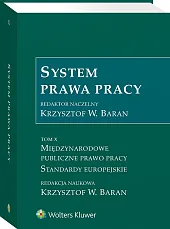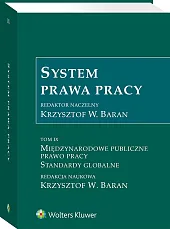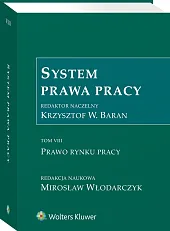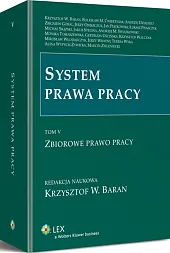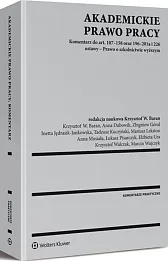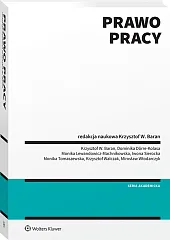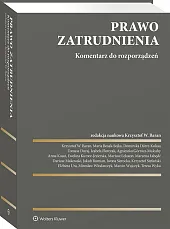The book is a complete analysis of the institution of the Polish labour law.
Outline of Polish Labour Law System
Outline of Polish Labour Law System
The book is a complete analysis of the institution of the Polish labour law.
Opis publikacji
The book is a complete analysis of the institution of the Polish labour law. It covers issues regarding both individual and group working relationships, especially those which involve trade unions, worker's councils and European works councils. Topics referring to the job market and the role of the state in its regulation have also been touched upon.
This comprehensive analysis of the Polish labour law will allow the readers to fully familiarise themselves with regulations of labour law which are binding in Poland.
The book will be useful not only for the readers from abroad. A number of institutions of the Polish labour law are presented in great detail. Many cases introduce different views from judicial decisions and the most appropriate manner of interpreting the provisions. Owing to the above, this book will be of invaluable assistance to practitioners working in international corporations or for international clients.
The public...
The book is a complete analysis of the institution of the Polish labour law. It covers issues regarding both individual and group working relationships, especially those which involve trade unions, worker's councils and European works councils. Topics referring to the job market and the role of the state in its regulation have also been touched upon.
This comprehensive analysis of the Polish labour law will allow the readers to fully familiarise themselves with regulations of labour law which are binding in Poland.
The book will be useful not only for the readers from abroad. A number of institutions of the Polish labour law are presented in great detail. Many cases introduce different views from judicial decisions and the most appropriate manner of interpreting the provisions. Owing to the above, this book will be of invaluable assistance to practitioners working in international corporations or for international clients.
The publication takes into account the current legal status and new regulations introduced to the Labour Code with respect to contracts for a fixed term and parental leaves.
Fragment dla Ciebie
Informacje
Spis treści
TITLE ONE
GENERAL LABOUR LAW | p. 19
Chapter I
The concept and subject-matter of labour law | p. 21
1. Definitions of labour law | p. 21
2. Classification of labour law | p. 24
3. Characteristics of labour law | p. 25
3.1. General notes | p. 25
3.2. Uniformity and differentiation of labour law | p.
...
TITLE ONE
GENERAL LABOUR LAW | p. 19
Chapter I
The concept and subject-matter of labour law | p. 21
1. Definitions of labour law | p. 21
2. Classification of labour law | p. 24
3. Characteristics of labour law | p. 25
3.1. General notes | p. 25
3.2. Uniformity and differentiation of labour law | p. 26
3.3. Europeanisation of labour law | p. 26
Chapter II
Labour law in the Polish legal system | p. 28
1. General notes | p. 28
2. Labour law and civil law | p. 28
3. Labour law and social insurance law | p. 29
4. Labour law and copyright law | p. 30
5. Labour law and constitutional law | p. 30
6. Labour law and administrative law | p. 31
7. Labour law and criminal law | p. 31
8. Labour law and international law | p. 32
Chapter III
Functions of labour law | p. 33
1. Overview of functions of labour law | p. 33
2. Protective function of labour law | p. 34
3. Organisational function of labour law | p. 35
4. Irenic function of labour law | p. 36
5. Redistributive function of labour law | p. 38
Chapter IV
Interpretation of provisions of labour law | p. 40
1. The concept and subject-matter of interpretation of labour laws | p. 40
2. Types of interpretation of labour law provisions | p. 41
3. Process of interpretation of labour laws | p. 42
4. Loopholes in labour law | p. 43
Chapter V
Principles of labour law | p. 45
1. The concept and meaning of labour law principles in the Polish labour law doctrine | p. 45
2. Systematisation of the principles of labour law | p. 47
3. Functions of labour law principles | p. 49
4. Characteristics of fundamental principles of labour law set out in the Labour Code | p. 51
4.1. Principle of the right to work and the freedom of labour | p. 51
4.2. Principle of freedom to enter employment relationship and to determine the terms of employment | p. 54
4.3. Principle of respect by an employer of employee's dignity and of other employee's personal rights | p. 56
4.4. Principle of equal treatment and non-discrimination in employment | p. 59
4.5. Principle of the right to fair remuneration for work | p. 60
4.6. Principle of the right to rest | p. 63
4.7. Principle of provision by an employer of safe and healthy working conditions | p. 65
4.8. Principle of meeting the vital, social and cultural needs of employees | p. 67
4.9. Principle of facilitation of skills upgrading | p. 68
4.10. Favourability principle (zasada uprzywilejowania pracownika) | p. 69
4.11. Fundamental principles of collective labour law | p. 72
Chapter VI
Overview of the history of the Polish labour law | p. 74
Chapter VII
Equal treatment in employment | p. 78
1. The concept of equal treatment | p. 78
2. Principle of equal treatment in employment | p. 79
3. Forms of discrimination | p. 79
4. Harassment and sexual harassment | p. 80
5. Justified differentiation | p. 81
6. Consequences of breach of the principle of equal treatment in employment | p. 81
Chapter VIII
Sources of labour law | p. 83
1. The concept and hierarchy of sources of labour law | p. 83
2. General sources of labour law | p. 85
2.1. Constitution of the Republic of Poland | p. 85
2.2. Acts/laws (ustawy) | p. 86
2.3. Regulations (rozporządzenia) | p. 88
3. Specific sources of labour law | p. 89
3.1. Collective agreements | p. 89
3.1.1. Legal nature of collective agreements | p. 89
3.1.2. Personal scope of collective agreements | p. 90
3.1.3. Material scope of collective agreements | p. 91
3.1.4. Procedures for the conclusion of collective agreements | p. 93
3.1.5. Registration of collective agreements | p. 94
3.1.6. Entry into force of collective agreements | p. 96
3.1.7. Transformations of collective agreements | p. 96
3.1.8. Termination of collective agreements | p. 97
3.1.9. Sectoral collective agreements (ponadzakładowe układy zbiorowe pracy) | p. 99
3.1.10. Company-level collective agreements (zakładowe układy zbiorowe pracy) | p. 100
3.2. Agreements in connection with transfer of business to a new employer | p. 102
3.3. Agreement on suspension of provisions of labour law | p. 103
3.4. Agreements on application of less favourable terms and conditions of employment | p. 104
3.5. Teleworking agreements | p. 105
3.6. Social agreements (porozumienia społeczne) 1 | p. 05
4. Internal regulations | p. 106
4.1. Internal rules (regulaminy) | p. 106
4.1.1. Wage rules (regulamin wynagradzania) | p. 107
4.1.2. Work rules (regulamin pracy) | p. 109
4.2. Statutes (statuty) | p. 110
5. International labour law | p. 111
5.1. International labour regulations | p. 112
5.2. Labour law of the Council of Europe | p. 113
5.3. Legal acts adopted in the European Union and their effect | p. 114
5.4. Areas covered by European labour law | p. 116
TITLE TWO
INDIVIDUAL LABOUR LAW | p. 119
Chapter IX
Employment relationship | p. 121
1. Concept and nature of employment relationship | p. 121
1.1. Concepts of employment relationship | p. 121
1.2. Characteristics of employment relationship | p. 122
2. Labour law employment relationship (stosunek pracy) and other employment relationships (stosunki zatrudnienia) | p. 125
2.1. The concepts of "self-employment" and "employment" | p. 125
2.2. Types of non-employee employment (employment not between an employee and an employer) | p. 126
2.3. Elements of the labour law employment relationship | p. 129
3. Parties to the labour law employment relationship | p. 130
3.1. General notes | p. 130
3.2. Employee | p. 132
3.3. The concept of an employer | p. 133
3.4. Employer - a natural person | p. 134
3.5. Employer - an organisational unit | p. 135
3.6. Representation of an employer being an organisational unit | p. 138
Chapter X
Contract of employment | p. 140
1. Internal and external recruitment | p. 140
2. Protection of personal data of job candidates and employees | p. 140
3. Types of contracts of employment | p. 142
3.1. Contract for a probationary period (umowa na okres próbny) | p. 142
3.2. Contract for a fixed term (umowa na czas określony) | p. 143
3.3. Contract of employment for an indefinite term (umowa o pracę na czas nieokreślony) | p. 144
4. Telework | p. 144
5. Contents of a contract of employment | p. 145
Chapter XI
Transformations of an employment relationship | p. 147
1. Change of an employment relationship | p. 147
2. Agreement to amend the terms and conditions of employment (porozumienie zmieniające) | p. 150
3. Notice of amendment of the terms and conditions of a contract of employment (wypowiedzenie zmieniające warunki umowy o pracę) | p. 152
4. Assignment of an employee to other work | p. 162
5. Temporary change of terms and conditions of a contract of employment resulting from specific regulations | p. 166
Chapter XII
Termination of an employment relationship | p. 168
1. Introduction | p. 168
2. Agreement between the parties | p. 169
3. Restrictions on termination of a contract of employment | p. 169
3.1. General protection of sustainability of an employment relationship | p. 169
3.2. Consultation (with a company trade union organisation) of the intention to terminate a contract for an indefinite term | p. 170
3.3. Consultation (with a company trade union organisation) of the intention to terminate a contract of employment without notice | p. 172
3.4. Special protection of sustainability of an employment relationship | p. 173
3.5. Restrictions on termination of a contract of employment by reason of personal or family situation of an employee | p. 173
3.5.1. Protection of the employment relationship during a pre-retirement period | p. 173
3.5.2. Protection of the employment relationship during a period of excusable absence | p. 174
3.5.3. Protection of the employment relationship of pregnant women or women during maternity leave | p. 175
3.6. Restrictions on termination of a contract of employment based on the employee's function | p. 176
3.6.1. Special protection of sustainability of the employment relationship of employees performing trade union functions | p. 176
3.6.2. Special protection of sustainability of the employment relationship of members of workers' council | p. 184
3.6.3. Special protection of sustainability of the employment relationship of a social labour inspector | p. 185
4. Termination of a contract of employment upon notice | p. 185
4.1. Notice of termination of a contract of employment as a unilateral declaration of will | p. 185
4.2. Scope of application of a notice of termination as a method of termination of a contract of employment | p. 188
4.3. Formal requirements | p. 189
4.4. Notice periods for termination of a contract of employment | p. 193
4.5. Reduction of a notice period | p. 196
4.6. Job-search leave of absence (zwolnienie na poszukiwanie pracy) | p. 198
5. Termination of a contract of employment without notice | p. 199
5.1. Termination of a contract of employment without notice by an employer | p. 200
5.1.1. Termination of a contract of employment without notice by an employer for reasons attributable to an employee | p. 200
5.1.2. Termination of a contract of employment without notice by an employer for reasons not attributable to an employee | p. 203
5.2. Termination of a contract of employment without notice by an employee | p. 205
5.2.1. Termination of a contract of employment without notice by an employee for reasons not attributable to an employer | p. 205
5.2.2. Termination of a contract of employment without notice by an employee for reasons attributable to an employer | p. 206
6. Legal consequences of defective termination of a contract of employment | p. 207
6.1. Legal consequences of defective termination of a contract of employment upon notice | p. 207
6.2. Legal consequences of defective termination of a contract of employment without notice by an employer | p. 210
6.3. Legal consequences of defective termination of a contract of employment without notice by an employee | p. 212
7. Other cases of termination of a contract of employment by an employee | p. 213
7.1. Termination of a contract of employment in connection with reinstatement | p. 213
7.2. Termination of a contract of employment in connection with acquisition of an employee by a new employer | p. 215
8. Expiration of a contract of employment | p. 215
8.1. Death of an employee | p. 215
8.2. Death of an employer | p. 215
8.3. Employee's absence from work caused by pre-trial detention | p. 215
8.4. Claims in connection with expiration of an employment relationship | p. 216
Chapter XIII
Transfer of an establishment to another employer | p. 217
1. The concept of transfer of an establishment or a part of an establishment to another employer | p. 217
2. Succession of obligations | p. 218
3. Negotiations with an employees' representation and information obligation in the absence of trade unions | p. 219
4. Rights of employees | p. 220
Chapter XIV
Employment of temporary agency workers | p. 222
1. Introduction | p. 222
2. Restrictions on temporary agency work | p. 222
2.1. Material restrictions | p. 223
2.2. Time restrictions of temporary agency work | p. 223
2.3. Personal restrictions | p. 224
2.3.1. User-employer | p. 224
2.3.2. Temporary-work agency | p. 225
3. Conclusion and content of a temporary work contract | p. 225
4. Protection of a temporary agency worker against discrimination | p. 228
Chapter XV
Non-contractual employment relationships | p. 229
1. The concept and classification of non-contractual employment relationships | p. 229
1.1. The concept and origins of non-contractual employment relationships | p. 229
1.2. Classification of non-contractual employment relationships | p. 231
2. Employment relationship by election (wybór) | p. 231
2.1. The scope of employment relationships by election | p. 231
2.2. Legal nature of an employment relationship by election | p. 232
2.3. Establishment of an employment relationship by election | p. 233
2.4. Admissibility of amendment of the terms and conditions of employment by election | p. 234
2.5. Ending the employment relationship by election | p. 234
2.6. Rights and obligations of elected employees | p. 236
3. Employment relationship by appointment (powołanie) | p. 237
3.1. The scope of employment relationships by appointment | p. 237
3.2. Legal nature of the act of appointment | p. 239
3.3. Establishment of an employment relationship by appointment | p. 240
3.4. Admissibility of amendment of the terms and conditions of employment by appointment | p. 241
3.5. Ending the employment relationship by appointment | p. 243
3.6. Terms of employment relationship of appointed employees | p. 245
4. Employment relationship by nomination (mianowanie) | p. 246
4.1. The scope of employment relationships by nomination | p. 246
4.2. Legal nature of the act of nomination | p. 247
4.3. Establishment of an employment relationship by nomination | p. 248
4.4. Amendment of the terms and conditions of employment by nomination | p. 250
4.5. Ending the employment relationship of nominated employees | p. 252
4.6. Terms of employment relationship of nominated employees | p. 254
Chapter XVI
Rights and obligations of the parties to an employment relationship | p. 256
1. Obligations of an employer | p. 256
1.1. Information obligation | p. 256
1.2. Obligation to properly organise work | p. 259
1.3. Obligation to prevent discrimination | p. 260
1.4. Obligation to ensure safe and healthy working conditions | p. 261
1.5. Obligation to pay wages timely and properly | p. 261
1.6. Obligation to facilitate upgrading of professional skills | p. 262
1.7. Obligation to create an environment conducive to adaptation to proper performance of work | p. 262
1.8. Obligation to meet social needs of employees | p. 263
1.9. Obligation to apply objective and fair criteria of evaluating employees | p. 263
1.10. Obligation to keep documentation and personnel files | p. 264
1.11. Obligation to foster development of the rules of social coexistence in the workplace | p. 264
1.12. Obligation to prevent mobbing | p. 265
1.13. Obligation to issue an employment certificate (świadectwo pracy) | p. 267
1.13.1. Contents of an employment certificate | p. 269
1.13.2. Legal fictions in the employment certificate | p. 269
1.13.3. Procedure for rectification of the employment certificate | p. 270
2. Claim for compensation | p. 271
3. Obligations of an employee | p. 272
3.1. Obligation to perform work diligently and with due care | p. 272
3.2. Obligation to comply with superiors' instructions | p. 273
3.3. Employee's obligations relating to order at the workplace | p. 274
3.4. Obligation to have regard for the welfare of the establishment | p. 275
3.5. Obligation of secrecy | p. 277
3.6. Obligation to comply with the rules of social coexistence | p. 278
Chapter XVII
Non-compete obligation | p. 280
1. General principles | p. 280
2. Restrictions on competitive activity in the absence of non-compete agreement | p. 281
3. Non-compete agreement during the term of employment relationship | p. 282
4. Post-employment non-compete agreement | p. 282
Chapter XVIII
Remuneration for work | p. 285
1. Legal bases for wage setting | p. 285
2. Prohibition of wage discrimination | p. 288
3. Protection of remuneration for work | p. 289
3.1. Rules of payment of remuneration | p. 289
3.2. Restrictions on deductions from remuneration | p. 290
4. Benefits in the case of non-performance of work | p. 291
5. Benefits payable to an employee in connection with ending an employment relationship | p. 293
6. Protection of employees' claims in case of the employer's insolvency | p. 294
Chapter XIX
Working time | p. 296
1. The concept of working time | p. 296
2. Number of working hours | p. 297
3. Rest period | p. 298
4. Working time systems 2 | p. 98
5. Overtime work | p. 302
6. Duty hours | p. 304
7. Working time of managers | p. 305
8. Work at night | p. 306
9. Work on Sundays and on public holidays | p. 307
Chapter XX
Leaves | p. 309
1. Annual leave | p. 309
1.1. Essential elements of the concept of annual leave | p. 309
1.2. Acquisition of right to the annual leave | p. 310
1.3. Amount of the annual leave | p. 310
1.4. Rules for granting of leave | p. 312
1.5. Deferral of the leave in unforeseen circumstances | p. 313
1.6. Proportionate leave | p. 315
1.7. Leave on demand | p. 315
1.8. Termination of a contract of employment and the right to annual leave | p. 316
2. Unpaid leave | p. 316
3. Special leaves (zwolnienia okolicznościowe) | p. 317
Chapter XXI
Liability for breach of order at the workplace and disciplinary liability | p. 319
1. General notes | p. 319
2. Liability for breach of order at the workplace (odpowiedzialność porządkowa) | p. 319
2.1. Legal nature and conditions of liability for breach of order at the workplace | p. 319
2.2. Infringements and penalties for breach of order at the workplace | p. 320
2.3. Procedure for imposing penalties for breach of order at the workplace | p. 321
2.4. Appeals procedure | p. 324
2.5. Declaring the penalty null and void | p. 325
3. Disciplinary liability (odpowiedzialność dyscyplinarna) | p. 326
3.1. Personal scope and conditions of disciplinary liability | p. 326
3.2. Types of disciplinary penalties | p. 327
3.3. Disciplinary boards and disciplinary prosecutor | p. 328
3.4. Disciplinary procedure and judicial review of disciplinary decisions | p. 328
3.5. Deletion of penalty from files (zatarcie kary) | p. 329
3.6. Minor infringements | p. 330
Chapter XXII
Financial liability of employees | p. 331
1. Legal nature and conditions of financial liability of employees | p. 331
2. Financial liability for the damage caused by the employee unintentionally | p. 335
3. Financial liability for the damage caused by the employee intentionally | p. 336
4. Liability for damage caused to a third party | p. 337
5. Responsibility for the entrusted property | p. 338
5.1. Financial liability for the damage caused by the employee to the entrusted property | p. 338
5.2. Mitigation of liability for the entrusted property | p. 341
5.3. Joint liability of employees for the entrusted property | p. 343
6. Limitation of claims | p. 345
Chapter XXIII
General protection of labour | p. 346
1. Introduction | p. 346
2. Basic obligations of an employer in respect of the occupational health and safety (OHS) | p. 347
2.1. Responsibility for health and safety at work | p. 347
2.2. Obligation to cooperate with other employers | p. 347
2.3. Training obligation | p. 348
2.4. Obligation to familiarise the employees with OHS rules and regulations | p. 348
2.5. Obligations in respect of preventive health care of employees | p. 348
2.5.1. Obligation to inform of occupational risk | p. 348
2.5.2. Obligation to prevent occupational diseases and other work-related diseases | p. 349
2.5.3. Obligation to perform preventive medical examinations | p. 350
2.6. Obligation to provide employees with supportive drinks and meals | p. 351
2.7. Obligation to provide employees with appropriate hygiene and sanitary facilities and necessary personal hygiene and sanitary products | p. 351
2.8. Other obligations of the employer | p. 352
3. Rights and obligations of employees in respect of occupational health and safety | p. 352
3.1. Right to refrain from work | p. 352
3.2. Obligation to comply with OHS rules and regulations | p. 353
4. Labour protection bodies | p. 355
4.1. OHS service | p. 355
4.2. Occupational health and safety commission | p. 356
4.3. Consultations on occupational health and safety | p. 356
5. Compensation for property lost or damaged in connection with an accident at work | p. 357
Chapter XXIV
Protection of parenthood | p. 358
1. Introduction | p. 358
2. Prohibition on the employment of women in work which is particularly arduous or harmful to health | p. 359
3. Principles of employment of pregnant workers | p. 360
4. Leaves connected with raising children | p. 361
5. Rights of employees raising children | p. 364
6. Special protection of sustainability of employment relationship | p. 365
Chapter XXV
Employment and protection of work of young people and children | p. 367
1. Employment of adolescents | p. 367
1.1. Introduction | p. 367
1.2. Contract of employment for vocational preparation (umowa o pracę w celu przygotowania zawodowego) | p. 369
1.3. Protection of health of young workers | p. 371
1.4. Employment of adolescents under a contract of employment for performing light-duty work | p. 372
2. Employment of children below 16 years of age | p. 373
TITLE THREE
COLLECTIVE LABOUR LAW | p. 377
Chapter XXVI
Freedom of association | p. 379
1. Introduction | p. 379
2. Freedom of association in trade unions and employers' organisations | p. 380
2.1. Freedom of association in trade unions | p. 380
2.2. Freedom of association in employers' organisations | p. 382
2.3. Models of organisation of workers' and employers' movement | p. 383
3. Independence of trade unions and employers' organisations | p. 385
4. Self-governance of trade unions and employers' organisations | p. 388
Chapter XXVII
Legal status of trade unions | p. 393
1. Establishment of trade unions | p. 393
2. Registration of trade unions | p. 394
3. Functions of trade unions | p. 396
4. Powers of trade unions | p. 398
Chapter XXVIII
Employers' organisations | p. 405
1. Establishment of employers' organisations | p. 405
2. Registration of employers' organisations | p. 406
3. Functions and powers of employers' organisations | p. 407
Chapter XXIX
Employee participation | p. 409
1. Introduction | p. 409
2. Ad hoc representatives | p. 409
3. Workers' councils | p. 410
4. European Works Council | p. 413
5. Other forms of employee participation | p. 415
Chapter XXX
Social dialogue | p. 416
1. The concept of social dialogue | p. 416
2. Council of Social Dialogue (Rada Dialogu Społecznego) | p. 417
2.1. Competences of the Council of Social Dialogue | p. 418
3. Voivodeship (provincial) councils of social dialogue (wojewódzkie rady dialogu społecznego) | p. 420
4. Social dialogue in the law-making process | p. 421
5. Social dialogue on the labour market | p. 421
6. Social dialogue in matters relating to occupational health and safety | p. 422
7. Participation of representatives of social partners in supervision of public institutions as a form of social dialogue | p. 422
8. Social dialogue in the establishment | p. 424
Chapter XXXI
Collective labour disputes | p. 425
1. Introduction | p. 425
2. The subject-matter of a collective labour dispute | p. 426
3. Parties to a collective labour dispute | p. 428
4. Initiation of a collective labour dispute | p. 430
5. Methods of resolving collective labour disputes | p. 430
6. Irenic methods of resolving collective labour disputes | p. 431
6.1. Conciliation | p. 431
6.2. Mediation | p. 433
6.3. Arbitration | p. 434
7. Non-irenic methods of resolving collective labour disputes | p. 436
7.1. Strike | p. 436
7.1.1. Right to strike | p. 436
7.1.2. Restrictions of the right to strike | p. 437
7.1.3. Principles of organisation of a strike | p. 439
7.2. Other industrial actions | p. 443
7.3. Lockout | p. 444
TITLE FOUR
PROCEDURAL LABOUR LAW | p. 447
Chapter XXXII
Legal protection of labour relations | p. 449
1. Models of legal protection in labour relations | p. 449
2. Out-of-court legal protection bodies | p. 450
3. Labour courts | p. 452
3.1. Organisation of labour courts | p. 452
3.2. Powers of labour courts | p. 453
3.2.1. Introduction | p. 453
3.2.2. Matters involving claims arising from employment relationship | p. 453
3.2.3. Matters involving employment-related claims | p. 454
3.2.4. Matters involving claims arising from other legal relationships to which provisions of labour law apply under separate laws | p. 456
3.2.5. Actions for compensation against an employer in the event of accidents at work and occupational diseases | p. 457
3.2.6. Actions to establish existence or non-existence of a legal relationship or rights under an employment relationship | p. 457
Chapter XXXIII
Labour inspection | p. 459
1. Introduction | p. 459
2. National Labour Inspectorate (Państwowa Inspekcja Pracy, PIP) | p. 460
3. Social labour inspection | p. 463
4. Other supervisory and control bodies | p. 464
Chapter XXXIV
Limitation of claims and final deadlines | p. 466
1. Introduction | p. 466
2. Limitation of claims (przedawnienie roszczeń) | p. 467
3. Final deadlines (terminy zawite) | p. 474
Chapter XXXV
Accidents at work and occupational diseases - an overview | p. 476
1. Introduction | p. 476
2. Accidents at work | p. 477
3. An accident equivalent to an accident at work | p. 480
4. Procedure for determining circumstances and causes of accidents at work | p. 481
5. Occupational diseases | p. 481
6. Benefits in respect of accidents at work and occupational diseases | p. 483
Index | p. 485
Autorzy
Krzysztof W. Baran – profesor doktor habilitowany nauk prawnych; kierownik Katedry Prawa Pracy i Polityki Społecznej Uniwersytetu Jagiellońskiego; członek Rady Doskonałości Naukowej; senior partner w kancelarii specjalizującej się w prawie pracy, leading individual w rankingu Legal 500; autor, współautor i redaktor licznych publikacji naukowych z zakresu prawa pracy i ubezpieczeń społecznych, w tym kilkudziesięciu monografii, komentarzy i podręczników; redaktor naczelny czternastotomowego Systemu prawa pracy.
Dominika Dörre-Kolasa [ORCID 0000-0002-4134-741X] – doktor nauk prawnych, radca prawny i partnerka w Raczkowski Sp. k., od ponad 10 lat adiunkt w Katedrze Prawa Pracy i Polityki Społecznej Uniwersytetu Jagiellońskiego. Posiada ponad 20-letnie doświadczenie w zakresie prawa pracy i HR, ochrony danych osobowych pracowników, ochrony dóbr osobistych w zatrudnieniu ze szczególnym uwzględnieniem mobbingu i dyskryminacji. Doradza międzynarodowym korporacjom oraz polskim pracodawcom. Ponadto opracowuje projekty wewnątrzzakładowych źródeł prawa i prowadzi negocjacje ze związkami zawodowymi. Przeprowadza audyty zgodności z wymogami prawa i etyki w biznesie, a także doradza przy wdrażaniu rekomendacji. Jest cenionym wykładowcą na podyplomowych studiach z zakresu prawa pracy na Uniwersytecie Jagiellońskim, gdzie wykłada problematykę ochrony danych osobowych w zatrudnieniu, dyskryminacji oraz wybranych aspektów zbiorowego prawa pracy. Autorka licznych książek i publikacji akademickich i publicystycznych z zakresu prawa pracy i ochrony danych osobowych. Konsultantka wielu czasopism prawniczych. Prowadzi szkolenia i warsztaty, w szczególności dla kadry zarządzającej oraz członków komisji antymobbingowych. Otrzymała indywidualną rekomendację oraz wyróżnienie w rankingu Legal 500 EMEA w dziedzinie zatrudnienia.
Krzysztof W. Baran – profesor doktor habilitowany nauk prawnych; kierownik Katedry Prawa Pracy i Polityki Społecznej Uniwersytetu Jagiellońskiego; członek Rady Doskonałości Naukowej; senior partner w kancelarii specjalizującej się w prawie pracy, leading individual w rankingu Legal 500; autor, współautor i redaktor licznych publikacji naukowych z zakresu prawa pracy i ubezpieczeń społecznych, w tym kilkudziesięciu monografii, komentarzy i podręczników; redaktor naczelny czternastotomowego Systemu prawa pracy.
Dominika Dörre-Kolasa [ORCID 0000-0002-4134-741X] – doktor nauk prawnych, radca prawny i partnerka w Raczkowski Sp. k., od ponad 10 lat adiunkt w Katedrze Prawa Pracy i Polityki Społecznej Uniwersytetu Jagiellońskiego. Posiada ponad 20-letnie doświadczenie w zakresie prawa pracy i HR, ochrony danych osobowych pracowników, ochrony dóbr osobistych w zatrudnieniu ze szczególnym uwzględnieniem mobbingu i dyskryminacji. Doradza międzynarodowym korporacjom oraz polskim pracodawcom. Ponadto opracowuje projekty wewnątrzzakładowych źródeł prawa i prowadzi negocjacje ze związkami zawodowymi. Przeprowadza audyty zgodności z wymogami prawa i etyki w biznesie, a także doradza przy wdrażaniu rekomendacji. Jest cenionym wykładowcą na podyplomowych studiach z zakresu prawa pracy na Uniwersytecie Jagiellońskim, gdzie wykłada problematykę ochrony danych osobowych w zatrudnieniu, dyskryminacji oraz wybranych aspektów zbiorowego prawa pracy. Autorka licznych książek i publikacji akademickich i publicystycznych z zakresu prawa pracy i ochrony danych osobowych. Konsultantka wielu czasopism prawniczych. Prowadzi szkolenia i warsztaty, w szczególności dla kadry zarządzającej oraz członków komisji antymobbingowych. Otrzymała indywidualną rekomendację oraz wyróżnienie w rankingu Legal 500 EMEA w dziedzinie zatrudnienia.
Zbigniew Góral – profesor doktor habilitowany nauk prawnych; autor ponad 200 opracowań z zakresu teorii prawa pracy, indywidualnego prawa pracy, prawa urzędniczego oraz prawa bezrobocia.
Mariusz Lekston – doktor nauk prawnych; nauczyciel akademicki z wieloletnim dorobkiem dydaktycznym; prorektor ds. organizacyjnych i polityki kadrowej Wyższej Szkoły Humanitas w Sosnowcu, wykonujący w imieniu Uczelni czynności z zakresu prawa pracy.
Krzysztof Walczak - doktor habilitowany nauk prawnych; adiunkt na Wydziale Zarządzania Uniwersytetu Warszawskiego, wspólnik i konsultant w firmie prawniczej specjalizującej się w indywidualnym i zbiorowym prawie pracy; specjalista z zakresu polskiego, międzynarodowego i europejskiego prawa pracy w szczególności w zakresie wynagradzania i motywowania, rekrutacji, restrukturyzacji zatrudnienia oraz negocjacji ze związkami zawodowymi; redaktor naczelny miesięcznika „Monitor Prawa Pracy”; redaktor merytoryczny internetowego komentarza do Kodeksu pracy; autor około 200 publikacji na temat polskiego, międzynarodowego i europejskiego prawa pracy.
Mirosław Włodarczyk – doktor habilitowany nauk prawnych, profesor Uniwersytetu Łódzkiego; kierownik Katedry Prawa Pracy UŁ; specjalizuje się w dziedzinie indywidualnego i zbiorowego prawa pracy oraz prawa rynku pracy; autor publikacji naukowych dotyczących źródeł prawa pracy, podmiotów i treści prawa stosunku pracy, zatrudniania młodocianych oraz regulacji prawnych rynku pracy.
Marcin Wujczyk – doktor habilitowany nauk prawnych, adiunkt w Katedrze Prawa Pracy i Polityki Społecznej na Wydziale Prawa i Administracji Uniwersytetu Jagiellońskiego; radca prawny, partner w dużej kancelarii; specjalizuje się w prawie pracy; posiada kilkunastoletnie doświadczenie w obsłudze największych pracodawców krajowych i międzynarodowych; doradza największym spółkom w Polsce w zakresie procedur zwolnień grupowych, transferu przedsiębiorstwa oraz postępowań antymobbingowych i antydyskryminacyjnych; bezpośrednio wspiera w procesie decyzyjnym zarządy oraz dyrektorów personalnych spółek, w tym międzynarodowych; prowadzi zajęcia w obszarze prawa pracy dla aplikantów radcowskich; autor wielu publikacji z zakresie prawa pracy, a także pomocy dydaktycznych.
Opinie
Wybierasz książkę w tradycyjnej wersji papierowej oraz e-booka w popularnych formatach*.
Wybierasz książkę w tradycyjnej wersji papierowej
Wybierasz e-book w popularnych formatach*:
- - PDF - format dedykowany do czytania na urządzeniach z dużym ekranem np. na - komputerach PC, laptopach czy tabletach.
- - e-PUB - Format przyjazny do czytania na czytnikach i innych - urządzeniach mobilnych.
- - Mobi – E-booki w tym formacie możesz czytać m.in. na czytniku - Kindle.
*Informacje o dostępnym formacie znajdziesz na karcie produktu przy wyborze wersji e-book.
E-booki zakupione w księgarni profinfo.pl oznaczone są w sposób trwały znakiem wodnym (watermarkiem).


